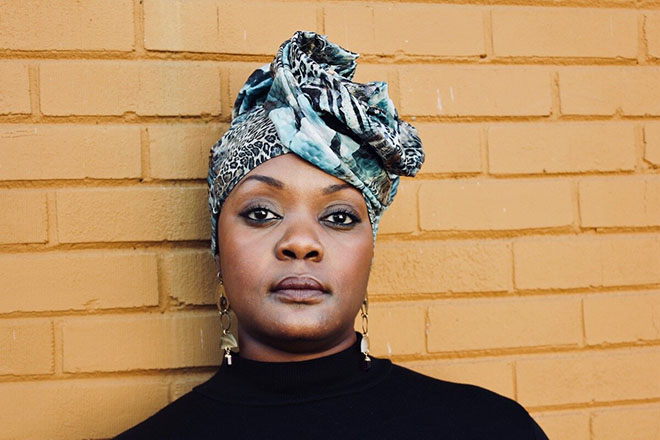
Video & Interview: KYSHONA
Video Feature & Web-Exclusive Interview
Artist: KYSHONA
Video: “Listen”
KYSHONA FEATURED AT BRAVERY ON FIRE: A BENEFIT FOR WOMEN’S CANCER RESEARCH THIS THURSDAY, SEPTEMBER 24
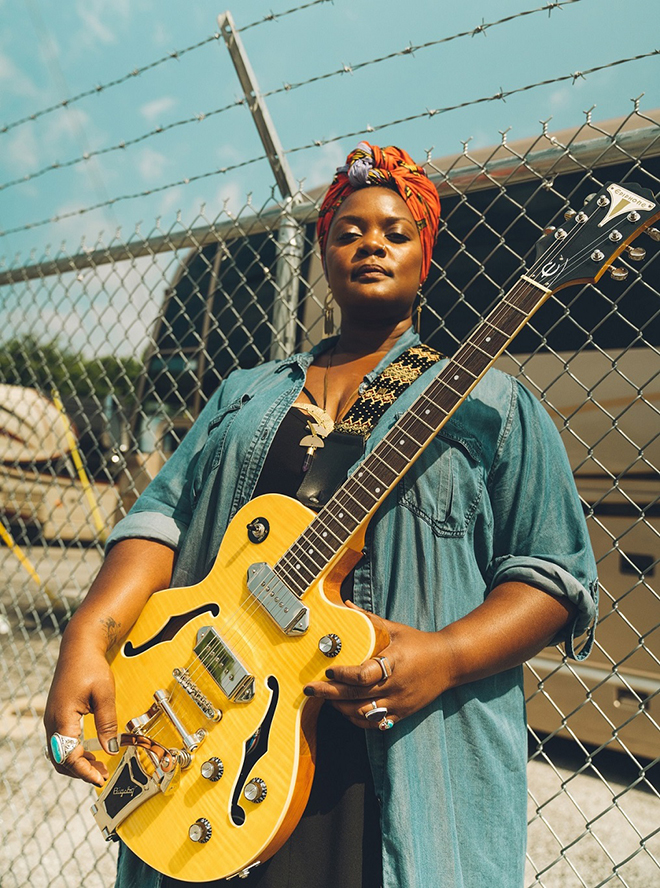
“Listen” is the powerful anthem we need in 2020. When Kyshona speaks her truth, with strong harmonies that make you want to sing along, you can’t help but listen.
Kyshona will be featured this Thursday, September 24 (8 PM Eastern) at Bravery on Fire: A Benefit for Women’s Cancer Research. She has set her intention to be a voice and a vessel for those who feel lost, forgotten, silenced and are hurting.
Rachael Sage, a self-described “cancer thriver” will bring together a powerful group of performers for a great cause this Thursday night to raise funds for Foundation for Women’s Cancer. Along with Kyshona, the livestream will feature Grammy winners Paula Cole and Lisa Loeb, Tony-winning Broadway actors Megan Hilty and Alison Pill, musicians Jill Sobule, Grace Pettis, Heather Mae & Crys Matthews, Grace Kelly, Toby Lightman, Gaby Moreno, Fiona Harte, dancer Abigail Simon and more. 100% of all proceeds will be donated to Foundation for Women’s Cancer.
The livestream will be overseen by Grammy and Emmy-winning music and television production company StreamTheory and livestreamed at BraveryOnFire.com, as well as Facebook Live and YouTube.
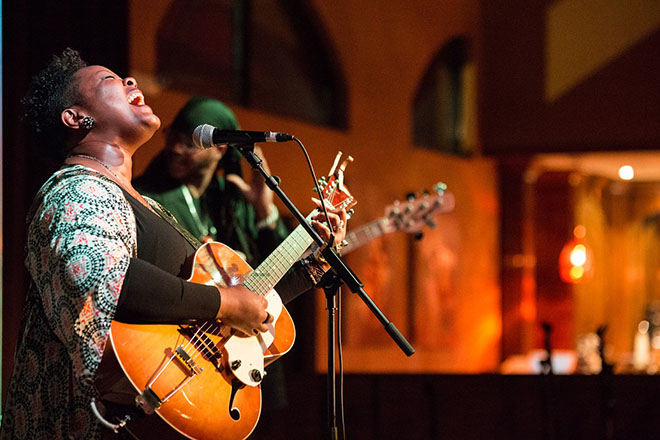
Kyshona Armstrong simply goes by Kyshona (pronounced Kuh-Shauna). She recently released her new album Listen. The title track “Listen” is the powerful anthem we need in 2020. When Kyshona speaks her truth, with strong harmonies that make you want to sing along, you can’t help but listen.
Within the grooves of its 10 tracks, Kyshona blends roots, rock, R&B and folk with lyrical prowess to uplift the marginalized and bring awareness to the masses. It’s for every silent scream, every heavy load, every fearful thought and the simmering sense of anger that the silenced, the lost and the forgotten try to hide from the world. After her moving performances, concertgoers often ask, “What can I do?” Her response—“Listen.”
We talked with Kyshona about her passion for songwriting and aligning it with a purpose, her need to be a voice and vessel for the silenced, why her skin-body-presence is a socially-conscious statement, how positive messages can be helpful coping skills, what inspires her creative process and what keeps her more hopeful in these unique times.
How did the album Listen evolve?
A few years ago I created a mission statement for myself: To be a voice and a vessel for those who feel lost, forgotten, silenced and are hurting. This album addresses my mission head on. Although I had written many of these songs over the course of four years, the songs on this album were chosen specifically for my mission and purpose.
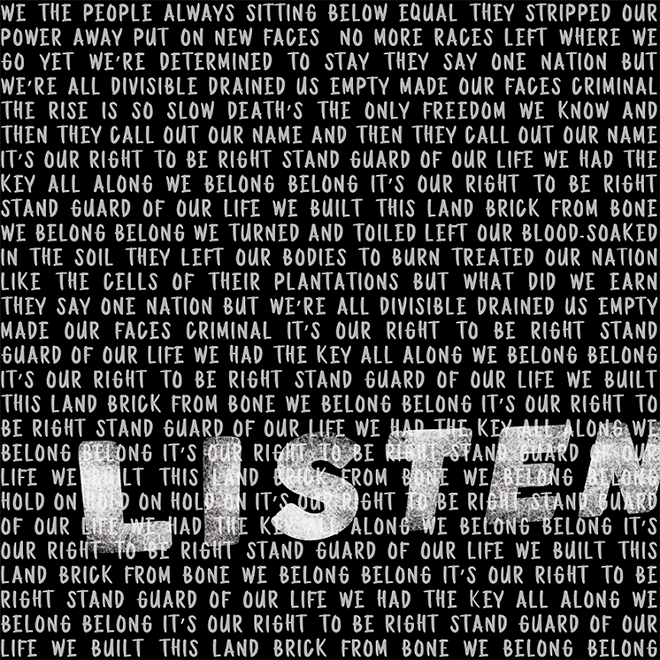
What is one thing you learned about yourself after you recorded this album?
I learned the importance of my voice—of aligning with a purpose in all areas of my life. I used to be fearful of speaking on specific issues and sharing my pain and frustrations, but with this album I have found a deeper connection with my audience because it has allowed them to listen and truly take in the story arc of Listen, and it has allowed me to feel emboldened by that.
Why is it important to be involved in this event?
“Bravery on Fire” involvement is important since I have had my own health issues and scares with my reproductive organs. There is a history of uterine cancer, breast cancer and uterine fibroids in my family. As a black woman, it is often the case that we are misdiagnosed because we do not present with the same symptoms as non BIPOC [Black, Indigenous and people of color] women. As a result of misdiagnosis and lack of resources, I had a very scary and upsetting surgery at the age of 38. It was then that I learned the importance of self-advocacy and research.
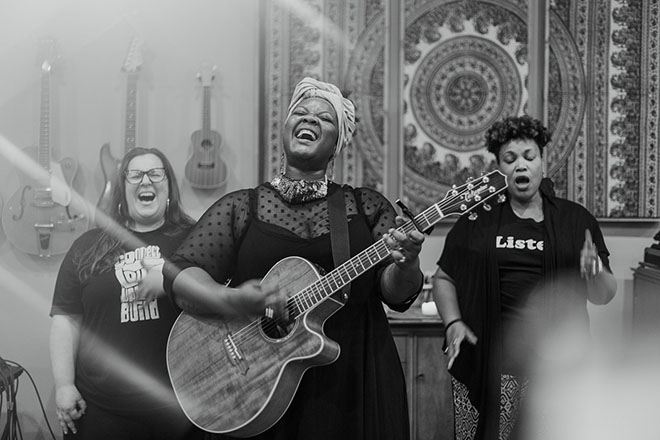
Do you feel the need to write socially-conscious songs?
With the skin and body I am in, any song I write is socially-conscious. My presence on a stage or in a room (where I am often the minority in the room) is a socially-conscious statement. My privilege of being able to speak directly to people, via a microphone or social media, drives me to write and speak on social issues.
In this unique socio-political time, how do you remain hopeful?
What makes me even more hopeful during this time is that I (we as artists) have people’s actual attention as society as a whole is working on actively listening.
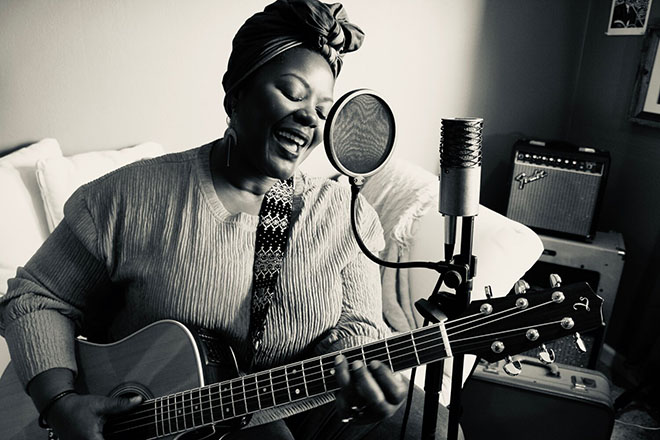
Who originally inspired you to write songs?
I was inspired to write songs by the patients I worked with when I was a certified music therapist. When I worked in mental health on forensics units, I had two young men, close to my age, who were poets and rappers. During our group therapy sessions, we would write songs about what they were struggling with, what mistakes they had made and what positive messages they needed to hear as a coping skill if they found themselves in crisis.
What songwriting tip would you like to offer?
Something that I learned from writing with them was the importance of writing from a stream of consciousness. That always allows me to speak directly to the subject at hand. For my own writing, I have found that when I am the most specific, the more I connect with my audiences.
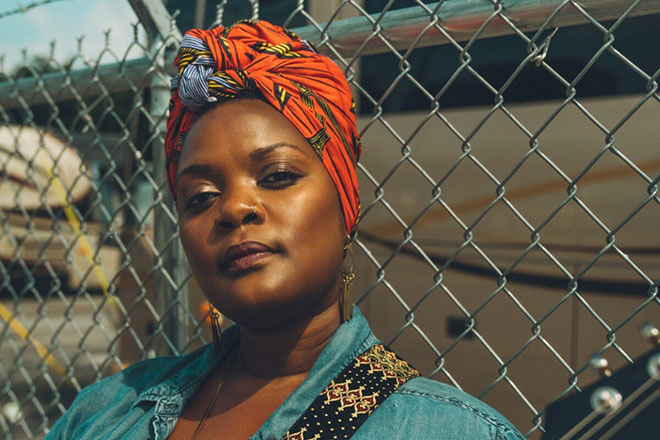
What instruments/equipment can you not live without?
I absolutely cannot live without my Takamine acoustic/electric guitar. I carry that guitar with me on planes, on stages and into nursing homes, jails and hospitals. I can walk into any space with my guitar on my back and bring others a sense of home and belonging. Although I usually write on piano or my acoustic guitar, it is always fun to reimagine and arrange my songs on an electric guitar. When I play my Epiphone Sheraton, I find that I sing in a completely different manner than I do with my Takamine. Although I am often performing solo, it is fun to have different guitar options to stretch me and challenge me vocally and creatively.
What’s so unique about your Takamine?
I play the EF360SC-TT dreadnought acoustic-electric guitar from Takamine’s Thermal Top Series—with Indian rosewood back and sides. The thermal top allows me to carry this guitar into various temperature environments and be confident that it will stay in tune and adjust quickly. This has been crucial, especially now that a lot of live shows have been moved to outdoor locations. It also has a cool tube (CT4B2 preamp) installed in the guitar’s electronics. This feature is my favorite when I perform solo because it boosts my low end. I love low end, and how it warms up my tone. When I play with my band, I can lower the tube’s action to brighten my tone and allow my guitar to cut through the full ensemble.
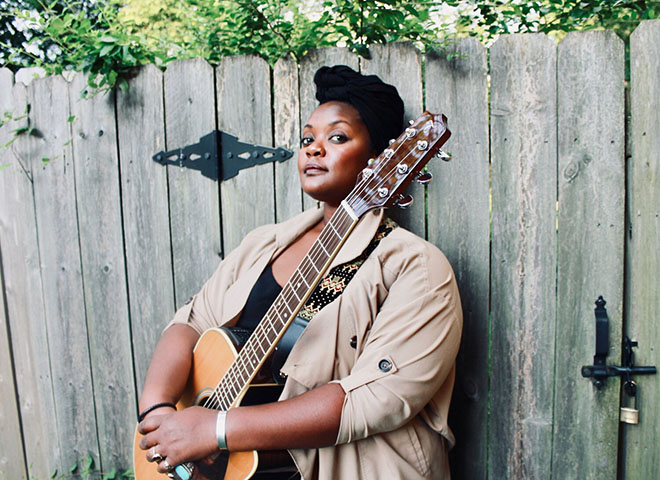
Tell us a “pinch me” moment when you thought “Wow, this is really happening to me!”
Earlier this year, I had the privilege of working on a project with producer, T Bone Burnett. My friend Adia Victoria (a gothic blues artist in Nashville) and I have been in similar circles. She has championed my work and connected me with so many people. She was working on a project with T Bone Burnett. He wanted more voices, and she threw my name in the hat. I have now worked with him on a few other projects and learned so much. I love hearing the conversations between him and his team. He’s a very real guy. He’s taking his platform and pushing the music to a message—to a movement. He’s been doing that throughout his career. I’m just grateful for someone who is in the music industry who understands the voices that need to be uplifted right now.
What is the best advice someone has given you?
The best advice given to me is from my 91-year-old Grandma Eva. Just the other day she told me to continue to be sweet and kind, and remember to be present and enjoy every moment rather than get caught up in all of the negativity.
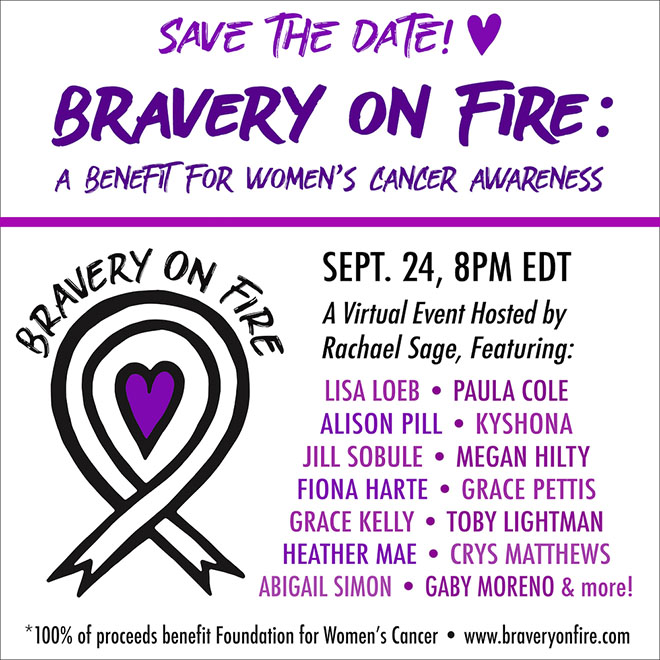
Where can new fans get more info and stay updated?
Instagram: @KyshonaMusic
Twitter: @kyshona



comment closed